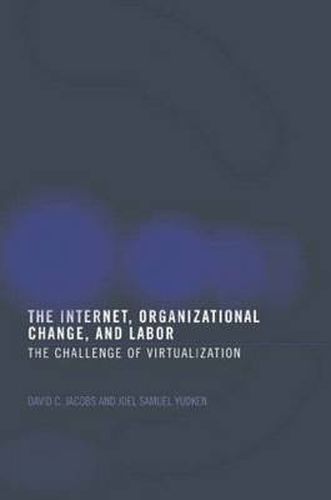Readings Newsletter
Become a Readings Member to make your shopping experience even easier.
Sign in or sign up for free!
You’re not far away from qualifying for FREE standard shipping within Australia
You’ve qualified for FREE standard shipping within Australia
The cart is loading…






The focus of The Internet, Social Intelligence & Labor is the impact of the Internet on human resources and the balance of power between labor and management. The Internet has contributed to the organization and mobilization of workers facing multinational corporations; it has permitted instantaneous contact across borders; it also facilitates communication among managers and permits the coordination of dispersed workplaces. Managers may more easily control an international network of production sites on-line. The Internet provides opportunities for managers and workers to pursue their overlapping and conflicting goals. Beyond its influence on the relative power of labor and management, the Internet may also have the capacity to extend ‘intelligence’ in organizations. It permits the individual to acquire information from disparate sources and to evaluate it with the assistance of a personal computer. Knowledge is cumulative; every advance in understanding rests upon the contributions of others. The Internet facilitates the dissemination of information and innovative software alike and accelerates the processes of analysis, innovation, and improvement. How does this alter the capacity of individuals and groups to manipulate knowledge and ultimately to construct and manage organizations? Many managers will use the Internet as a means to reduce labor costs. They will rely increasingly upon contingent employees who lack benefits and offices, and work from home. These employees will know little about the treatment of their co-workers and will have little power to compel improved treatment. Another possibility is that the Internet will enhance the potential of production by democratic networks of skilled craftsmen who exchange designs by e-mail and edit them on their personal computers. Traditional managers will oppose this vision of organizational reform, but others may find that quality and flexibility are enhanced by this approach.
$9.00 standard shipping within Australia
FREE standard shipping within Australia for orders over $100.00
Express & International shipping calculated at checkout
The focus of The Internet, Social Intelligence & Labor is the impact of the Internet on human resources and the balance of power between labor and management. The Internet has contributed to the organization and mobilization of workers facing multinational corporations; it has permitted instantaneous contact across borders; it also facilitates communication among managers and permits the coordination of dispersed workplaces. Managers may more easily control an international network of production sites on-line. The Internet provides opportunities for managers and workers to pursue their overlapping and conflicting goals. Beyond its influence on the relative power of labor and management, the Internet may also have the capacity to extend ‘intelligence’ in organizations. It permits the individual to acquire information from disparate sources and to evaluate it with the assistance of a personal computer. Knowledge is cumulative; every advance in understanding rests upon the contributions of others. The Internet facilitates the dissemination of information and innovative software alike and accelerates the processes of analysis, innovation, and improvement. How does this alter the capacity of individuals and groups to manipulate knowledge and ultimately to construct and manage organizations? Many managers will use the Internet as a means to reduce labor costs. They will rely increasingly upon contingent employees who lack benefits and offices, and work from home. These employees will know little about the treatment of their co-workers and will have little power to compel improved treatment. Another possibility is that the Internet will enhance the potential of production by democratic networks of skilled craftsmen who exchange designs by e-mail and edit them on their personal computers. Traditional managers will oppose this vision of organizational reform, but others may find that quality and flexibility are enhanced by this approach.